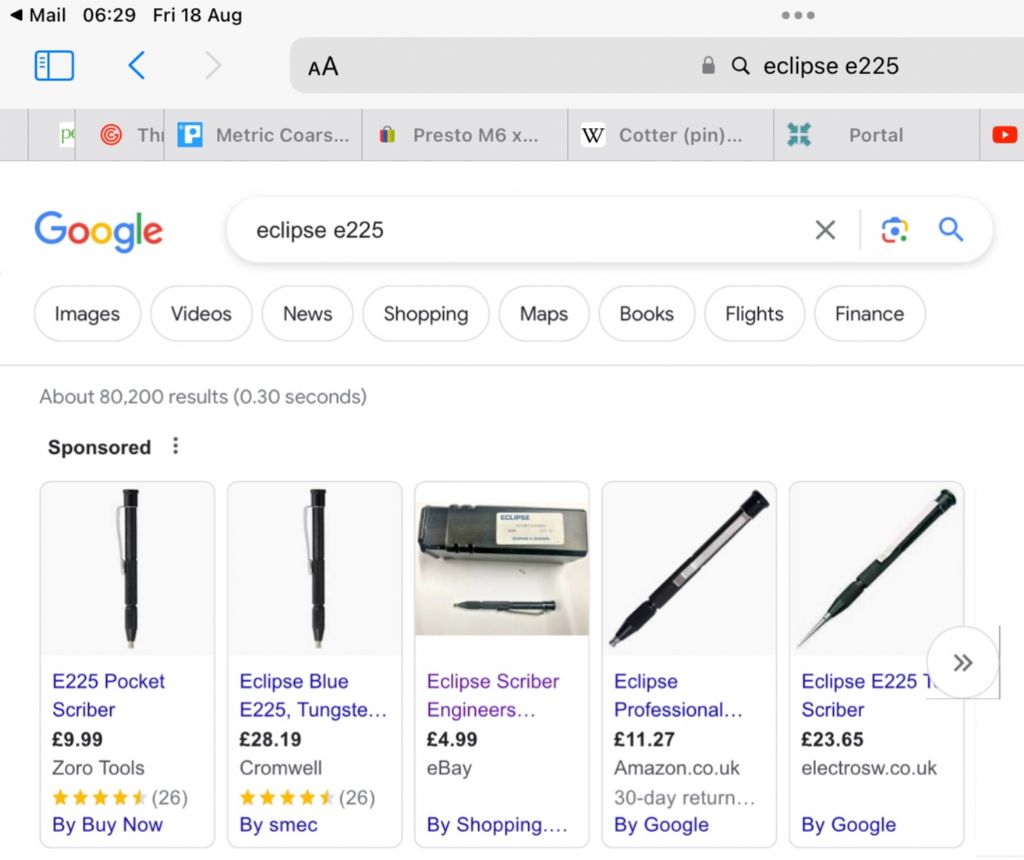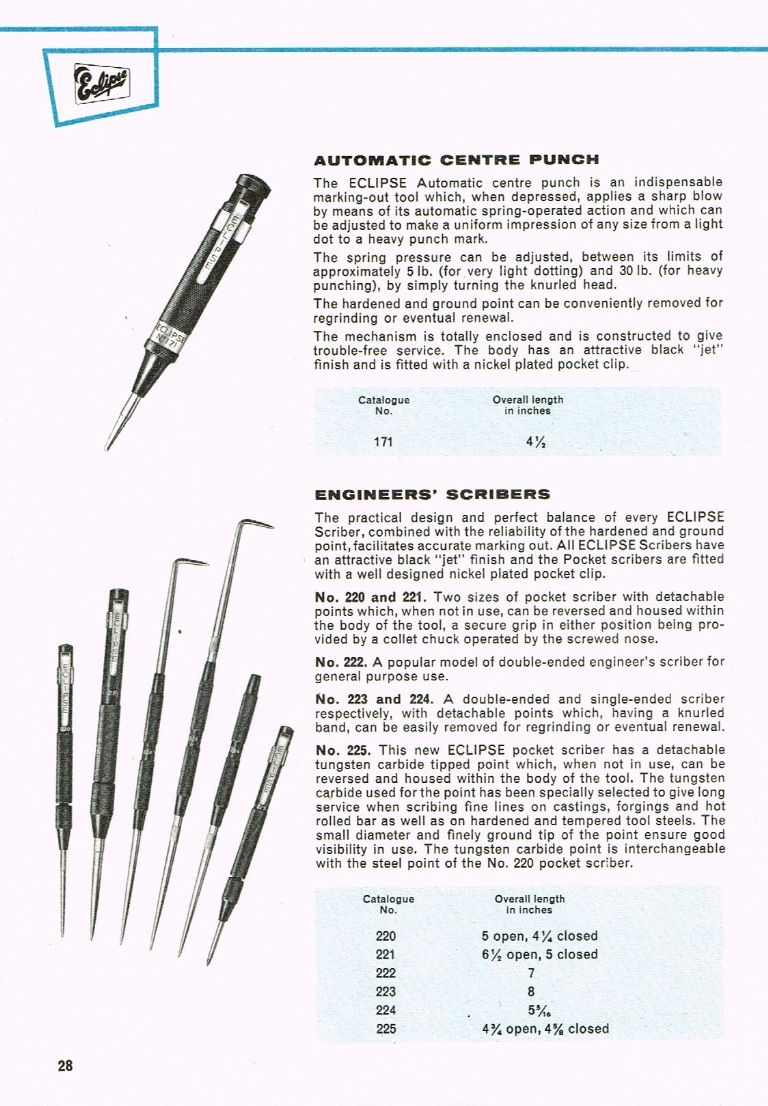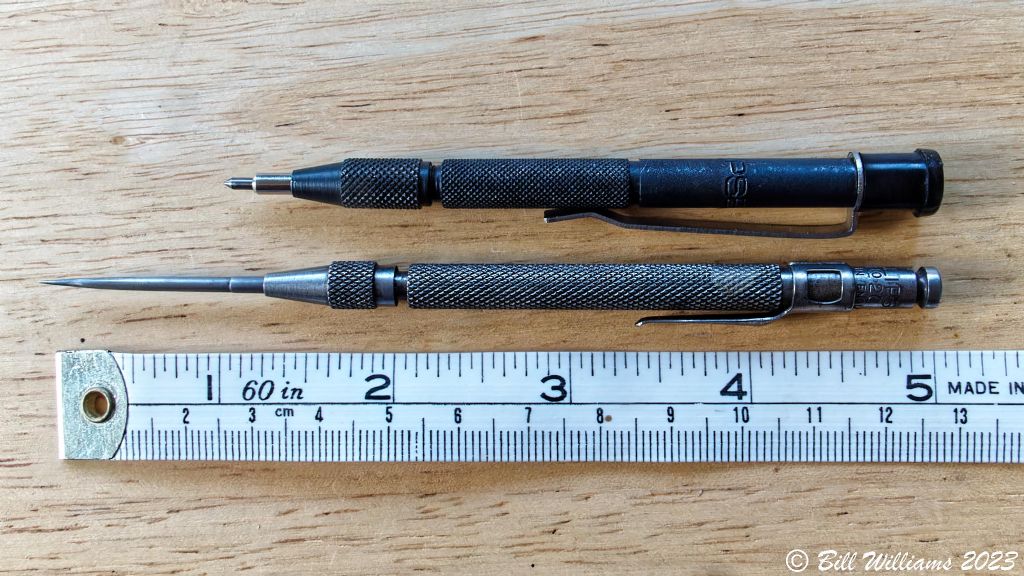Posted by Chris Crew on 18/08/2023 08:23:45:…
… I have bought cheap drills before and can't really tell the difference from my sets of Dormers in performance. I know others will disagree.
I bought a job-lot of these Eclipse scribers many years ago from the closing-down clearance of Mercer's in Cleckheaton and gave them to colleagues in appreciation for assistance rendered. I am pleased to see that they are still available, although I would imagine that they are no longer manufactured in the UK, but what is these days?
Cheap versus well-made drills like Dormers are difficult to compare because so much depends on how they are used.
Industry, especially manufacturing, put a lot of effort into getting the maximum value out of cutting tools. One way of doing this is to buy reliable cutters and operate them within tightly specified limits. Running within specified limits allows tool life to be measured and compared with tool-cost. Many factors apply, for example it's probably not worth buying best quality to drill a few low tolerance holes in soft metal. Down-time due to tool changing is often a major expense. When usage is controlled, it becomes obvious whether more expensive high-spec drills are worth the investment, or it's cheaper overall to buy middle or low-specification drills. In industry, it's all about money!
Jobbing workshops, and especially hobbyists, work in ways that make it difficult to assess tool life. Typically, the same drill is used on different materials, different thicknesses, different machines, with and without coolant, by an operator working at different speeds. The work can be abusive, for example drilling thin steel-sheet without a backing, struggling into work-hardening stainless, by pushing too hard, not clearing swarf and many other faults. Much depends on the type of work being done: in my rough workshop, it makes sense to buy inexpensive mid-range, and treat twist-drills as consumables. When better is needed, I buy one in specially and look after it. Others work in ways where it makes sense for their tools to be well-made and looked after, only buying cheap on special occasions. After several years I suspect most hobby workshops end up with a mix of inexpensive tools for rough and a selection of better tools only used when better is really needed.
Eclipse is a trademark. It was registered by James Neill and Co (Sheffield) in 1909. Neill were a major player in steel-making and tools, absorbing other famous firms like Moore and Wright as they grew. In 1985 Neill bought Spear and Jackson, and in 1995 renamed the whole company Spear and Jackson. In 2014 Spear and Jackson were bought by SNH Global Holdings Ltd. SNH describe themselves: 'SNH has become a global business. With a historically strong presence in China and the UK, we have extended our operations into other territories and now have manufacturing sites, distribution centres and sales offices in key locations around the world. Each of these divisions operates autonomously within the Group. This autonomy, we believe, encourages management independence, entrepreneurism and ownership.' List of companies here.
As is the case with multinationals, products are made wherever in the world it happens to be most profitable.
I'm pleased to say UK Engineering is holding it's own. The value produced is about the same as it ever was. True that large numbers of firms making ordinary products went to the wall, often in a sad welter of mismanagement, poor labour relations and low productivity. Unfortunately lots of interesting jobs went too – agonising. Surviving firms moved up-market, and mostly only make expensive high-end products. Rather than lots of old-fashioned firms scratching a living making pots, pans, and pen-knives, the same money today is earned from high-tech – MRI scanners, aerospace, and electronics etc. British Industry and the character of the workforce has changed, not disappeared, and it's globalised. Difficult to buy anything these days and be certain it was specifically made in one country only. Designed in the West, made in the East is a common pattern, and quite likely an international holding company has a head office in Lichtenstein, banks in the Caymans, is registered in Switzerland, trades on the London Stock Exchange, and pays tax in Eire! Though it makes us rich, I doubt it's a good thing in the long run.
Dave
 Nicholas Farr.
Nicholas Farr.






